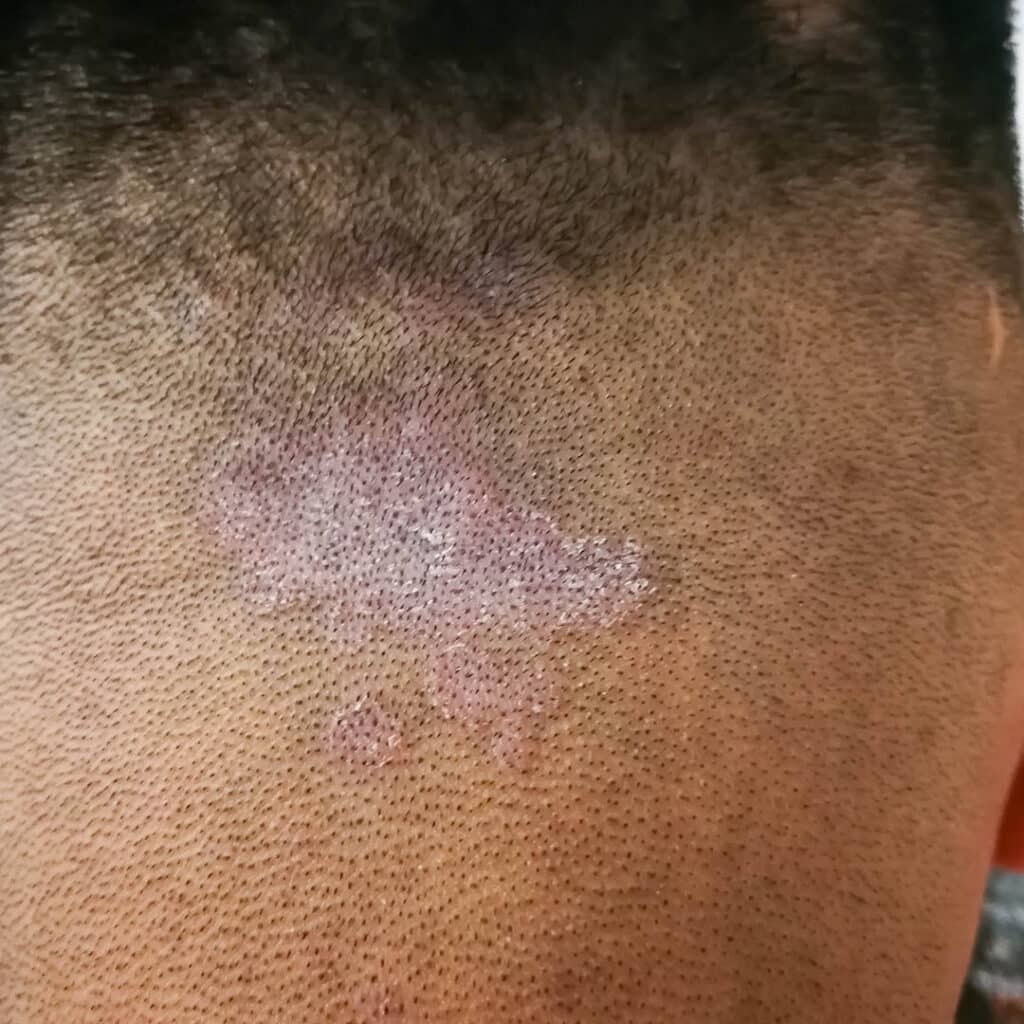What's the Condition of Your Hair and Scalp?
The condition of your hair and scalp can impact the health and appearance of your hair. Here are some common conditions that can affect your hair and scalp:

-
Dandruff: Dandruff is a condition that causes dry, flaky skin on the scalp. It can be caused by a variety of factors, including dry skin, yeast overgrowth, and certain skin conditions like psoriasis.
Dry scalp: A dry scalp can cause itching, redness, and flaking. It can be caused by a variety of factors, including harsh shampoos, overuse of styling products, and exposure to cold, dry air.
Oily scalp: An oily scalp can cause hair to look greasy and limp, and can also contribute to breakouts and acne on the scalp. It can be caused by overproduction of sebum, the natural oil produced by the scalp.
Scalp psoriasis: Scalp psoriasis is a skin condition that causes red, scaly patches on the scalp. It can be itchy and uncomfortable, and can also cause hair loss in some cases.
-
Alopecia: Alopecia is a condition that causes hair loss, and can occur on the scalp, eyebrows, and other areas of the body. There are several types of alopecia, including androgenetic alopecia, alopecia areata, and scarring alopecia.
Fungal infections: Fungal infections, such as ringworm, can cause hair loss and itching on the scalp.
If you are experiencing any of these conditions, it is important to seek the advice of a dermatologist or trichologist. They can diagnose the underlying cause of your symptoms and recommend appropriate treatments, including medications, lifestyle changes, and hair care products. By taking care of your hair and scalp, you can help to maintain the health and appearance of your hair.
Hair Loss
Hair loss is a common condition that can affect people of all ages and genders. There are many causes of hair loss, including genetics, hormonal changes, stress, medical conditions, and certain medications. Some of the most common types of hair loss include:
Androgenetic alopecia: Also known as male or female pattern baldness, androgenetic alopecia is the most common cause of hair loss in both men and women. It is caused by a combination of genetics and hormones, and typically results in a receding hairline and thinning of the hair on the crown.
Alopecia areata: Alopecia areata is an autoimmune condition that causes hair to fall out in patches. It can affect the scalp, as well as the eyebrows, beard, and other areas of the body.
Telogen effluvium: Telogen effluvium is a temporary form of hair loss that occurs when the hair growth cycle is disrupted, causing hair to fall out in large clumps. It can be caused by stress, hormonal changes, and certain medications.
Scarring alopecia: Scarring alopecia is a type of hair loss that occurs when the hair follicle is damaged, leading to permanent hair loss. It can be caused by conditions such as lichen planopilaris and central centrifugal cicatricial alopecia.
Traction alopecia: Traction alopecia is a type of hair loss that occurs when the hair is pulled too tightly, causing damage to the hair follicle. It can be caused by tight braids, extensions, and other hairstyles that put excessive strain on the hair.
If you are experiencing hair loss, it is important to seek the advice of a dermatologist or trichologist. They can diagnose the underlying cause of your hair loss and recommend appropriate treatments, including medications, lifestyle changes, and hair care products. By taking care of your hair and scalp, you can help to prevent or slow down hair loss, and maintain the health and appearance of your hair.
Hair Getting Loose All of a Sudden
Sudden loosening of the hair, also known as sudden hair shedding, can be a concerning and stressful experience. There are several potential causes of sudden hair shedding, including:
Telogen effluvium: Telogen effluvium is a temporary form of hair loss that occurs when the hair growth cycle is disrupted, causing hair to fall out in large clumps. It can be caused by stress, hormonal changes, and certain medications.
Anemia: Anemia is a condition that occurs when there is a lack of red blood cells in the body, leading to fatigue and weakness. It can also cause hair loss.
Thyroid disorders: Thyroid disorders, such as hypothyroidism and hyperthyroidism, can disrupt the hair growth cycle and cause hair loss.
Nutritional deficiencies: Nutritional deficiencies, such as a lack of iron, zinc, and biotin, can lead to hair loss.
Stress: Chronic stress can cause hair to fall out, as the body diverts resources away from non-essential functions like hair growth.
Medical conditions: Certain medical conditions, such as autoimmune disorders and infections, can cause hair loss.
Loss of hair can be caused by medical conditions and hormonal changes.
Hormonal changes: Hormonal changes, such as those that occur during pregnancy, menopause, and thyroid disorders, can disrupt the hair growth cycle and cause hair to fall out.
Medical conditions: Certain medical conditions, such as autoimmune disorders, infections, and certain medications, can cause hair loss.
Polycystic ovary syndrome (PCOS): PCOS is a hormonal disorder that affects women and can cause hair loss.
Iron-deficiency anemia: Iron-deficiency anemia is a condition that occurs when there is a lack of iron in the body, leading to fatigue and weakness. It can also cause hair loss.
Diabetes: Diabetes can cause changes in the hair and scalp, leading to hair loss.
Alopecia areata: Alopecia areata is an autoimmune condition that causes hair to fall out in patches.
Telogen effluvium: Telogen effluvium is a temporary form of hair loss that occurs when the hair growth cycle is disrupted, causing hair to fall out in large clumps.
Scalp Conditions
There are many different scalp conditions that can affect the health and appearance of the hair, including:
Dandruff is a common scalp condition that causes white or yellowish flakes to form on the scalp and in the hair. It can be caused by a yeast-like fungus or an overproduction of oil.
Psoriasis is a skin condition that causes red, scaly patches to form on the scalp and other areas of the body. It can also cause hair loss.
Seborrheic dermatitis is a condition that causes red, scaly patches to form on the scalp and other areas of the face and body.
Fungal infections, such as ringworm and tinea capitis, can cause hair loss and other symptoms on the scalp.
Alopecia areata is an autoimmune condition that causes hair to fall out in patches.
Telogen effluvium is a temporary form of hair loss that occurs when the hair growth cycle is disrupted, causing hair to fall out in large clumps.
Scalp psoriasis is a condition that causes red, scaly patches to form on the scalp.
Autoimmune Disease
An autoimmune disease is a condition in which the body’s immune system mistakenly attacks healthy cells, tissues, and organs. This can result in inflammation, pain, and damage to affected areas of the body. There are many different types of autoimmune diseases, including:
Rheumatoid arthritis is a condition that causes inflammation in the joints, leading to pain, swelling, and stiffness.
Lupus is a chronic autoimmune disease that can affect many different parts of the body, including the skin, joints, kidneys, heart, and brain.
Multiple sclerosis is a condition that affects the central nervous system and can cause a wide range of symptoms, including muscle weakness, numbness, and vision problems.
Type 1 diabetes is a condition in which the body’s immune system attacks the insulin-producing cells in the pancreas, leading to high blood sugar levels.
Inflammatory bowel disease is a condition that causes inflammation in the digestive tract, leading to symptoms such as abdominal pain, diarrhea, and weight loss.
Celiac disease is a condition in which the body’s immune system reacts to gluten, a protein found in wheat, barley, and rye.
Alopecia areata is an autoimmune condition that causes hair to fall out in patches.


Bacterial, Fungal or Viral Conditions in hair
There are several bacterial, fungal, and viral conditions that can affect the hair and scalp, including:
Bacterial infections: Bacterial infections of the hair and scalp, such as folliculitis and impetigo, can cause redness, itching, and pain. They can also lead to hair loss and scarring if left untreated.
Fungal infections: Fungal infections, such as ringworm and tinea capitis, can cause hair loss, itching, and scaling on the scalp.
Viral infections: Viral infections, such as herpes simplex, can cause hair loss and other symptoms on the scalp.
In order to treat these conditions, it is important to accurately diagnose the underlying cause. This can be done through a physical examination, laboratory tests, and other diagnostic techniques. If a bacterial, fungal, or viral infection is the cause of your hair and scalp symptoms, your doctor may prescribe antibiotics, antifungal medications, or antiviral medications to help clear the infection. In some cases, lifestyle changes, such as maintaining good hygiene and avoiding close contact with infected individuals, may also be necessary to prevent the spread of infection and promote healing.
Parasites in hair
Parasites can sometimes infect the hair and scalp, leading to various symptoms such as itching, hair loss, and skin irritation. The two most common types of parasites that affect the hair and scalp are head lice and scabies.
Head lice are tiny insects that live on the scalp and feed on human blood. They can cause itching, redness, and discomfort.
Scabies is a skin condition caused by tiny mites that burrow into the skin, leading to itching and a rash.
To treat these parasites, it is important to see a doctor for a proper diagnosis and treatment plan. For head lice, over-the-counter or prescription medications can be used to kill the lice and their eggs. For scabies, prescription medications such as creams or lotions can be used to kill the mites and relieve symptoms. Additionally, proper hygiene and sanitation measures, such as washing bedding and clothing, can help prevent the spread of these parasites.



